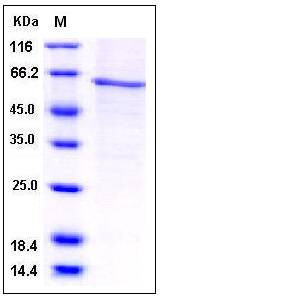Human AKT1 / PKB / PKBα Protein (His Tag)
AKT,CWS6,PKB,PKB-ALPHA,PRKBA,RAC,RAC-ALPHA
- 100ug (NPP3569) Please inquiry
| Catalog Number | P10763-H08B |
|---|---|
| Organism Species | Human |
| Host | Baculovirus-Insect Cells |
| Synonyms | AKT,CWS6,PKB,PKB-ALPHA,PRKBA,RAC,RAC-ALPHA |
| Molecular Weight | The recombinant human AKT1 consists of 491 amino acids and migrates as an approximately 57 kDa band as predicted in SDS-PAGE under reducing conditions. |
| predicted N | Met 1 |
| SDS-PAGE |  |
| Purity | > 87 % as determined by SDS-PAGE |
| Protein Construction | A DNA sequence encoding the human AKT1 (NP_001014431.1) (Met 1-Ala 480) was fused with a polyhistidine tag at the C-terminus. |
| Bio-activity | 1. No Kinase Activity 2. Measured by its ability to bind biotinylated human CD136 in a functional ELISA. |
| Research Area | Signaling |Signal Transduction |Other Related Intracellular Topics |Cellular Senescence and Pathways in Aging |Apoptosis |Nuclear | |
| Formulation | Lyophilized from sterile 50mM Tris, 100mM NaCl, 3mM DTT, 0.5mM PMSF, 5% Glycerol, pH 8.0 1. Normally 5 % - 8 % trehalose, mannitol and 0.01% Tween80 are added as protectants before lyophilization. Specific concentrations are included in the hardcopy of COA. |
| Background | v-akt murine thymoma viral oncogene homolog 1 (AKT1), or protein kinase B-alpha (PKB-ALPHA) is a serine-threonine protein kinase, belonging to the Protein Kinase Superfamily. AKT1 is a major mediator of the responses to insulin, insulin-like growth factor 1 (IGF1), and glucose. AKT1 also plays a key role in the regulation of both muscle cell hypertrophy and atrophy. AKT1 activity is required for physiologic cardiac growth in response to IGF1 stimulation or exercise training. In contrast, AKT1 activity was found to antagonize pathologic cardiac growth that occurs in response to endothelin 1 stimulation or pressure overload. AKT1 selectively promotes physiological cardiac growth while AKT2 selectively promotes insulin-stimulated cardiac glucose metabolism. AKT1 deletion prevented tumor initiation as well as tumor progression, coincident with decreased Akt signaling in tumor tissues. AKT1 is the primary Akt isoform activated by mutant K-ras in lung tumors, and that AKT3 may oppose AKT1 in lung tumorigenesis and lung tumor progression. A number of separate studies have implicated AKT1 as an inhibitor of breast epithelial cell motility and invasion. AKT1 may have a dual role in tumorigenesis, acting not only pro-oncogenically by suppressing apoptosis but also anti-oncogenically by suppressing invasion and metastasis. |
| Reference |
